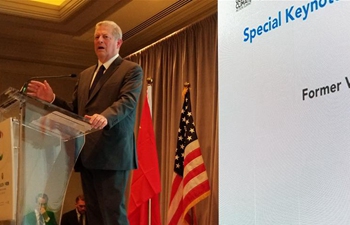LA PAZ, Sept. 14 (Xinhua) -- Recent reports have found that the consumption of junk and fast foods in Bolivia has risen nearly 200 percent in the last 15 years, representing a major risk to public health.
During an interview with Xinhua on Friday, Bolivian Health Minister Dabeiva Chavez explained that "fast food" is popular across all age groups due to its low price and accessibility.
According to Chavez, who is also the Health Promotion initiative director, national and international fast food chains have proliferated in most large Bolivian cities.
Stalls selling "hamburgers, fries, candies and processed beverages are found outside schools where children and young people consume them," she said.
"They are also found outside work places, at any time of the day," the minister added.
Chavez believes that because both parents in a family now work, there is no one available to prepare quality home-cooked meals.
"Children and parents now have to eat in the streets where the availability of junk food is huge. This affects health," said Chavez.
On September 12, Yecid Umacayo, director of the Food and Nutrition United of the Bolivian Ministry of Health, stated his concerns over the alarming increase in the consumption of junk food.
The director pointed to an investigation carried out by the Pan-American Health Organization (OPS) and the Food and Agriculture Organization of the United Nations (FAO) reporting a rise of 180-200 percent in the consumption of junk food containing high levels of sugar, grease and salt in Bolivia.
According to the study, the long-term consumption of these foods produces can lead to at least seven non-communicable illnesses and obesity.
Overweight or obese people are more likely to have diabetes, high blood pressure, cardiovascular diseases or even certain cancers, said the report.
These diseases account for 70 percent of deaths in the country, according to data from the Ministry of Health's National Program on Non-Communicable Diseases.
In 2016, the Bolivian government passed the Promotion of Healthy Eating act to educate the population to eat healthy food so as to reduce related diseases.
Alongside healthy eating habits, the act also encouraged people to do physical exercise and regulated the advertising and labelling of food and non-alcoholic beverages.
On September 12 during the Wellness Week in the Americas, Bolivia's Ministry of Health recognized the work of institutions committed to promoting healthy lifestyles to the population.
















